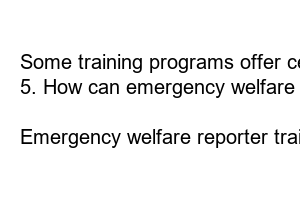긴급복지 신고의무자 교육
Title: Emergency Welfare Reporter Training: Preparing for Crisis Response
Introduction:
In times of emergency, the need for accurate and timely information becomes paramount. Emergency welfare reporters play a vital role in providing essential updates to the public, ensuring their safety, and bridging the gap between authorities and citizens. Equipping yourself with the necessary skills and knowledge through emergency welfare reporter training is crucial to effectively handle crisis situations and contribute to the betterment of society.
1. The Role of Emergency Welfare Reporters:
Emergency welfare reporters are first responders, delivering real-time, reliable information to individuals affected by emergencies. They act as empathetic communicators, sharing updates on emergency services, evacuation measures, and available resources to help the affected communities.
2. Understanding Crisis Communication:
Crisis communication is a crucial aspect of emergency welfare reporter training. It involves the ability to distill complex information into easily understandable chunks while maintaining accuracy. Through training, individuals can learn the art of conveying critical details concisely and with compassion.
3. Developing Interviewing Skills:
Interviewing victims, witnesses, and authorities during emergency situations requires special skills. Reporters learn how to ask open-ended questions, listen carefully, and effectively empathize with those affected. By honing these skills, emergency welfare reporters can gather comprehensive information while demonstrating sensitivity to people’s emotions.
4. Handling Social Media and Digital Platforms:
With the advent of social media, emergency welfare reporters must be well-versed in utilizing these platforms to spread crucial information rapidly. Training equips reporters with the skills to effectively engage with online communities, dispel rumors, and disseminate verified updates through concise, attention-grabbing posts.
5. Ethics and Sensitivity:
Emergency situations demand reporters to be sensitive to the traumatic experiences of victims. Through training, they learn ethical guidelines that govern reporting during crises, such as respecting privacy, avoiding graphic content, and using appropriate language. Sensitivity training helps reporters strike a balance between the need for information and the wellbeing of those affected.
6. Crisis Management Principles:
Training equips emergency welfare reporters with essential crisis management principles. Understanding the dynamics of emergencies and crisis response enables them to make informed decisions under pressure. They learn to assess risks, prioritize information dissemination, and collaborate effectively with emergency responders.
7. Enhancing Personal Wellbeing:
While reporters focus on serving the community during crises, it is crucial to address the impact on their own mental and emotional well-being. Training programs often include modules on self-care, stress management, and resilience-building techniques. These enable reporters to perform their duties effectively while taking care of their own mental health.
Summary:
Emergency welfare reporter training is an essential component of crisis preparedness. Through this training, reporters gain the skills to communicate critical information efficiently, empathize with affected individuals, and utilize digital platforms responsibly. They learn how to strike a balance between the need for accurate reporting and the sensitivity required during crises. Ultimately, training not only equips reporters with valuable crisis management principles but also emphasizes the importance of personal well-being in the noble task of emergency reporting.
FAQs:
1. How long does emergency welfare reporter training typically last?
Emergency welfare reporter training can vary in length, but most programs range from a few days to several weeks, depending on the depth of the curriculum.
2. Are there any specific qualifications required to enrol in emergency welfare reporter training?
No specific qualifications are typically necessary. However, a strong command of language, good communication skills, and an ability to remain calm under pressure are generally beneficial.
3. Can anyone become an emergency welfare reporter?
Yes, anyone with a passion for helping others and dedication to providing accurate information during crises can pursue a career as an emergency welfare reporter.
4. Are there any certifications or licenses offered after completing the training?
Some training programs offer certifications or licenses that validate the acquired skills and knowledge, enhancing one’s credibility as an emergency welfare reporter.
5. How can emergency welfare reporters maintain accuracy in fast-paced emergency situations?
Training equips reporters with techniques to verify information from credible sources before sharing it with the public, ensuring accuracy even in fast-paced scenarios.
6. Is emergency welfare reporter training only relevant during natural disasters?
Emergency welfare reporter training is not limited to natural disasters. It is applicable during any crisis, including incidents such as accidents, public health emergencies, or civil unrest.

